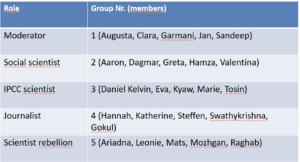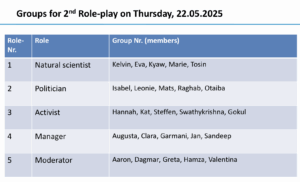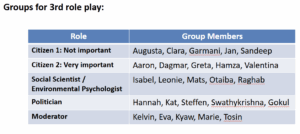Why, What and How?
Why do we want you to play roles?
An important approach of this course is role-playing. Rather than just talking about different perspectives and actors, we want you to bring these actors to life and see their perspectives from their individual point of view. This brings various new challenges and difficulties, but is also fun and inspirational.
How will this work? What do you have to do?
The role plays will take place in three classes throughout the semester (specific dates t.b.d). Each role play includes several roles (for example, social scientist, economist, natural scientist, politician), and lasts for about half of the class (around 45 minutes). Each role play consists of three phases:
Phase 1: Course session before the role-play
- The role play is based on the input of the previous course session and is developed around a controversial question that is related to the perspective presented in the session.
- You will receive all necessary information about the upcoming role play: the roles involved and the question to be discussed at the end of the previous course session.
- You will form working groups that are permanent for the rest of the course:
- Group 1: Augusta, Clara, Garmani, Jan, Sandeep
- Group 2: Aaron, Dagmar, Greta, Hamza, Valentina
- Group 3: Daniel Kelvin, Eva, Kyaw, Marie, Tosin
- Group 4: Hannah, Katherine, Steffen, Swathykrishna, Gokul
- Group 5: Ariadna, Leonie, Mats, Mozhgan, Raghab
- We assign every group to a role (several roles + one moderator) and will inform you about the distribution during classes.
Phase 2: The week before the role-play in an upcoming course session
- Define your role concretely. Though we will try to be specific, some roles have different possible definitions. For example, a journalist could be a tabloid journalist or a science journalist. Discuss your options and decide on a definition.
- Read, read and read. Try to delve deeply into the world of your role.
- Find arguments for a reasonable position of your role in relation to the question in the upcoming roleplay. We have selected questions that allow for controversial debates and contradictory positions. Prepare for the discussion in your role group.
- Decide who will be the main speaker in the upcoming discussion. The main speaker should address the key issues and summarize the position of your role. Other role group members act as ‘support’; they are also allowed to contribute to the discussion if they think it would be of benefit, but should not overshadow the main speaker in any way (see phase 3, point 1).
- If you are the moderator, think about interesting questions or a strategy to enrich or direct the discussions.
- Read through the Discussion_rules
Phase 3: The role-play itself
- The main speakers and the moderator will engage in a discussion in class. If someone else wants to make a statement, speaking time can be requested via raising your hand. The moderator will grant you speaking time.
- At the beginning of the role-play, the moderator introduces the question and starts the role-play by asking each role group to answer the question. The debate develops around differences, similarities or other aspects. The point is to understand both the justifications behind different perspectives, as well as the unifying ideas.
- If one of your groups wants to write a blog entry about the role play, he or she should take notes about important aspects of the debate. You can also take photos (if the subjects are okay with it, ask first!), or include other ideas in your documentation.
- After 35-40 minutes we stop the actual (moderated) role play and give you about 5-10 minutes to reflect on your experiences, ideas and thoughts.
What can you do to take the most out of this experience?
- Understand, don’t just act like you do. You will get a lot more out of this if you really try to understand the arguments and perspective of your role. Aspects to consider are, for example, institutional settings, motivation, legitimisation and working ethos. Don’t think or act in stereotypes. Bring the role to life by understanding its thinking and not by reproducing your understanding of that role.
- Communicate clearly and constructively. Always be helpful and open to new ideas.
- Don’t get frustrated. This is new for all of us. Things and plans will fail and others will succeed. We are all part of this learning process.
- Ask questions!
- A role-play is a debate, not a fight. It is not about ‘right’ answers nor about finding any joint answer at all. It is about discussing and understanding different perspectives on the topic at hand. The more you let go of the idea that not finding a joint answer is a failure, the more you will learn and enjoy role-playing.
- Have fun!
Some avenues that may be explored this year include:
- What should be the role of scientists in the climate debate? Should we maintain the separation between climate science and climate advocacy/activism?
- Do we know enough about the climate system for initiating a major transformation of societies?
- Would it be appropriate to hide uncertainties or lack of understanding when communicating climate science?
This year’s role plays:
Role-play 1 on 08.05.2025: “Uncertain climate futures and academic activism: The leak of the IPCC AR6 WGIII draft„
Remember the recent case of (ir)responsible scientist-activist action that we discussed in the Intro to Social Sciences Class: Hartz, F. (2022): Leaking the IPCC: a question of responsibility? (https://doi.org/10.1002/wcc.814)
Consider, e.g., the following questions:
- Do you think that the leak of the draft report is responsible?
- Which role conflicts do arise?
- How far should scientists go to advocate for their climate futures?
Five groups (arguments based on research on reactions to the leak):
- Moderators (please open role-play with some context on the case)
- Social scientists (work on concepts of responsibility, the science-policy interface and the role of uncertainty in public debates)
- IPCC scientists & officials (formal response to leak, individual opinions)
- Journalists (reported on the leak)
- Scientist rebellion (have leaked IPCC AR6 WGIII draft report)

Role-Play 2:
Topic:
“Given the inherent uncertainties in the results of climate models,
should climate mitigation and adaptation policy rely on the projections based
on climate models?“
Five roles:
1. Natural scientist: scientific expert in a discipline related to climate sciences
arguing for the use of climate projections
2. Politician: Decision-maker of a conservative party, accepting climate change
is human-made, but arguing for moderate climate action
3. Activist of “Fridays for Future” (“Listen to the Science!”, “Act now!”)
4. Manager of a company engaged in the energy sector. („We need robust
information for economic decisions.“)
5. Moderator

ROLE-PLAY 3 (for 12/06/2025)
Topic:
“How important should individual responsibility be in the subject of climate change mitigation?“
Five roles:
1. Citizen 1: Not important
– Impact on individual level negligible compared to industry/ the super-rich
– Responsibility shifting/ Greenwashing
2. Citizen 2: Very important
– Group conformity
– Impact of Purchasing decisions, Market demand
3. Social Scientist / Environmental Psychologist
– How much would people give up voluntarily?
– Impact of regulations
4. Politician
– Choice of political convictions up to the group
5. Moderator

